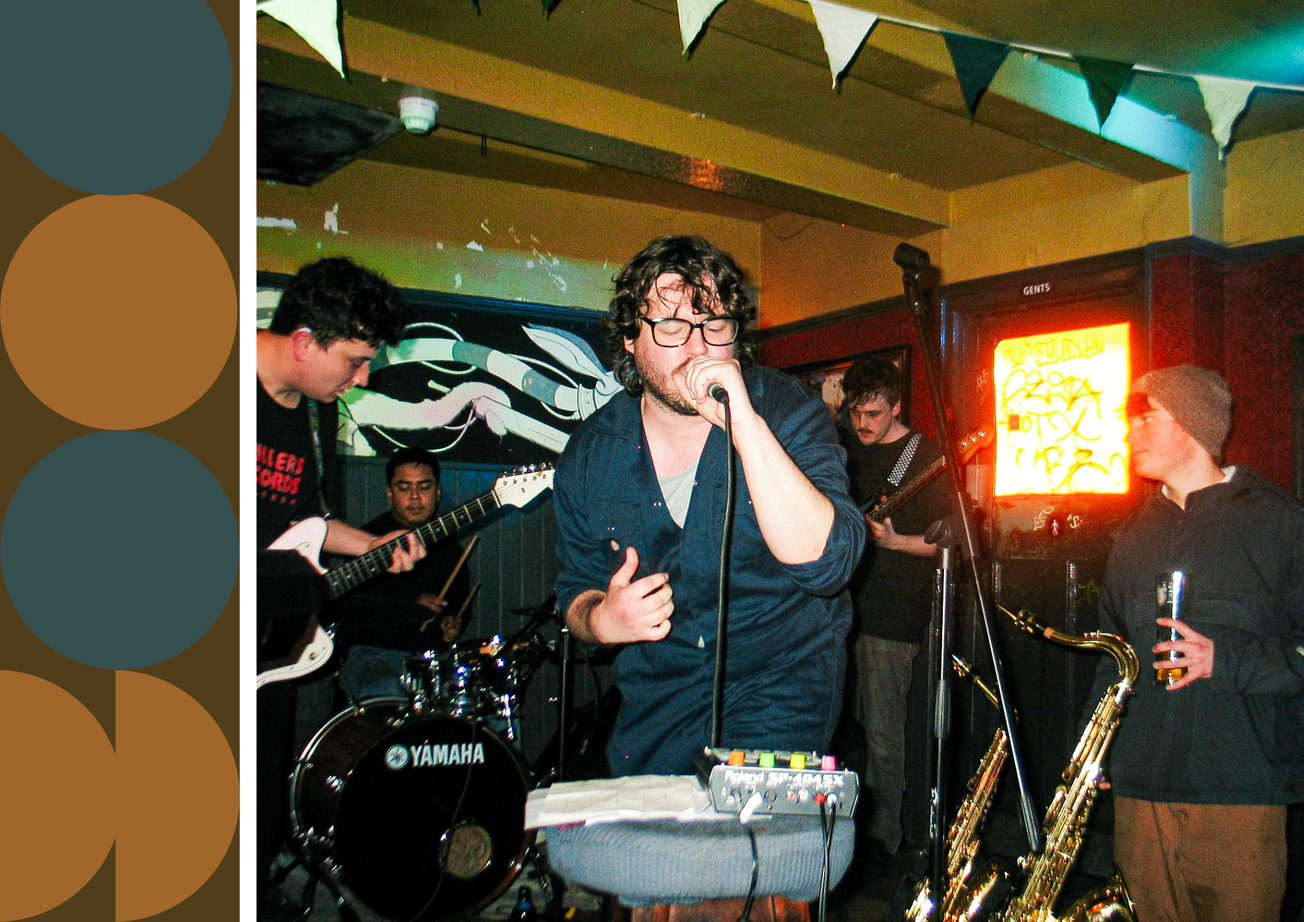By Tom Taylor, Deputy Features Editor
Content Warning: This article references content which is highly offensive and could be distressing to some.
Names have been redacted
Earlier last month, the Free Speech Society began posting anonymous submissions in their ‘discussion group’. Around 550 members of the closed Facebook group can submit thoughts and opinions with complete anonymity to await approval by the group’s administrators. Originally an open group, admins closed it on April 15 following a poll amongst members.
Whilst the Free Speech Society is affiliated to Bristol Students' Union, members of the discussion group are not necessarily students. One member wrote in a comment: ‘[I] have no idea how I ended up in this group having never even been to Bristol, and having graduated a couple of years ago, but it’s been wild reading’.

An early submission celebrates the anonymity of the forum: ‘This is such a good idea,’ the member writes, ‘since the left is so intolerant of views different to their own it makes it very difficult for me to express my views or have a discussion without being shit down (sic) and insulted...’
It soon became clear, however, that a significant proportion of the submissions posted were intended to shock and offend readers, rather than promote insightful debate. In a comment within the discussion group, a Free Speech Society admin wrote: ‘...posts won’t be turned down just because of their controversial content...but the amount of spam and trolling that gets submitted make (sic) it impossible to post everything.’
'...it is important to remain sensitive to this fact and critical to comments like this that can only facilitate division that leads to this prejudice' Bristol University Islamic Society
The admin goes on to comment, on a post dated April 16: ‘We do post everything that we believe to have been submitted sincerely as a discussion point.’ An anonymous submission, posted by admins on the same date, argues that the Notre Dame cathedral fire ‘indicates the erasure of European culture and values’ and that ‘Minarets will be erected in place of the fallen spire’. A ‘minaret’ is a spire typically found in the architecture of mosques.

A week later, admins approved a post which included the statement: ‘There’s nothing wrong with being afraid of religion, particularly Islam’. The contributor goes on to write: ‘Thinking that ALL Muslims believe in such practices is obviously egregious and shouldnt be taken seriously, however a lot do, and is pointing out the fact immediately “Islamophobic”? NO!’
The post concludes by asking: ‘...are people not entitled to be worried that if communities, in this case the Muslim community, becomes a dominant faith in the UK, that the rights of existing marginalised communities may be eroded?’
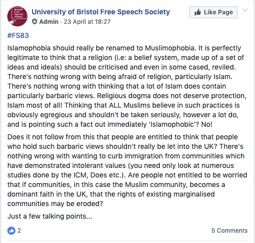
Bristol University Islamic Society, having seen these posts, told Epigram: ‘We recognise the right to free speech and discussion about Islam and have celebrated this ourselves many times, including in our ‘Ask a Muslim’ stalls and ‘Discover Islam’ week open sessions. Critical discourse is useful, and we are happy to engage with this and offer answers.’
The spokesperson went on to say: ‘However, we believe comments like this in an isolated space seem quite closed and don’t offer too much scope for open dialogue.’ ‘There is a risk,’ the Islamic Society argue, ‘of bubbles being created where students feel too divided to communicate and unsafe spaces that work against the objective of open and balanced discussion.’
‘Around the world Muslims, as well as other minorities, are facing persecution, and it is important to remain sensitive to this fact and critical to comments like this that can only facilitate division that leads to this prejudice’.
Some submissions posted to the group are clearly designed to shock and disgust readers. Members of the group have lamented their approval and the effect it could have on the society’s reputation. One such post, posted on April 30, asks ‘If a child consents to pedophilia (sic), should it be legal?’
'If people find this shocking, it just proves that we still have a lot of work to do on campus' Bristol University Free Speech Society
Earlier that week, a post intended to create discussion around ‘this group’s stance on incest’ was approved. Posts of this nature are portrayed as serious ‘discussion points’, stimulating intellectual debate. They are far more likely to cause distress to victims of child sexual abuse and familial sexual abuse than initiate a thought provoking discussion.
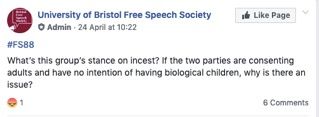
A topic frequently discussed on the group is trans rights. An anonymous post in late April feared that ‘the society is going to reach the stage where all the trans/LGBT members leave which’, the member argued, ‘could end really badly for us as it would be harder to defend ourselves against arguments that we are a transphobic society.’
This post followed an earlier submission asking whether ‘transmen (sic) are a threat to masculinity’. Under one post discussing the morality of giving children under the age of 18 hormone therapy, a vitriolic comment still remains arguing that a ‘stat would only be believable if it didn’t come from some odious trans centred lobby’ and that ‘...the trans cult should stop’.
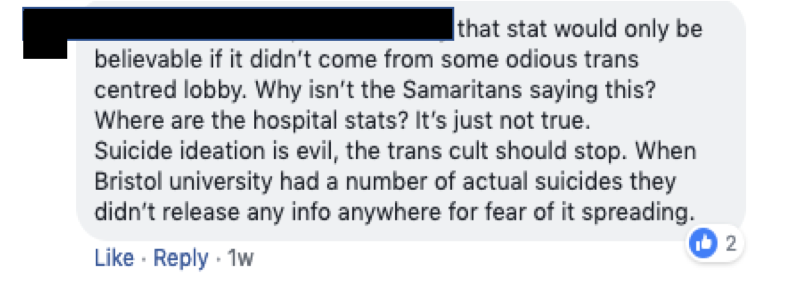
In reference to these submissions, Bristol University’s LGBT Network Chair told Epigram: ‘It appears that people are increasingly appealing to free speech to cover up hate speech’ and ‘it needs to be addressed that if people make homophobic, transphobic, or otherwise bigoted comments, they must be held accountable for the impact their words have’.
The Network Chair’s comment goes straight to the heart of the issue. ‘It’s even more worrying to let people’s actions and words remain unchecked’, they told Epigram. The Free Speech Society’s discussion group provides a platform for people to air highly offensive and discriminatory views without being held accountable.
There is a clear disconnect between the idea of an open and balanced discussion page, and an anonymous submissions forum which allows hateful views to be given a platform without dealing with the repercussions.

A post on April 17 argued that ‘numerous state-funded organisations within British Universities and British Politics’ are funded by Israel ‘to try and control British Politics’. J-Soc, a society which represents the voices of Jewish students at Bristol University, told Epigram that the post was ‘extremely worrying and distressing.’ ‘We, as J-Soc, continue to operate on a zero tolerance policy to these incidences so that we can eradicate anti-Semitism from campus’.
A post of this nature, perpetuating an anti-Semitic conspiracy theory, is unacceptable and in different circumstances the author would face consequences for publishing it. The anonymous nature of the forum prevents a key tenant of free speech and debate being practiced: holding people to account for their actions and words.
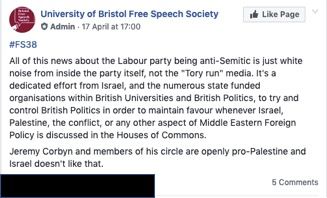
One of the most distressing posts was preceded by an admin notice which included the statement: ‘The sentiment expressed in this submission is one that we strongly disagree with. We post it because we want people to know that there are people with these views around.’
The post went on to posture that ‘...races should be kept separate, and there’s a lot of merit to the 1920s era racial science. I know that after WW2 there was a conspiracy to put fake egalitarian science in its place but we’re starting to see a resurgence and I’m glad’.
It is likely that this post was submitted to ‘troll’ readers - that is to provoke outrage and reaction for the sake of it. Whether this is the case or not, the view has been given a platform and put forward as a point of discussion. Not only is the argument in the post racist, it is rejected by all serious scientists. It highlights the perils of anonymous submission forums, especially when the admins have such a blatant disregard for the impact the approved posts can have on people.
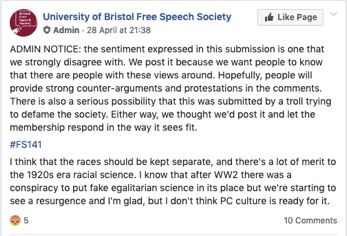
A recent post references an offensive Bristruth which mentioned a ‘diseased Somali brothel’. This post had already received significant backlash on Bristruths for being racist and discriminatory. The Free Speech Society post asked ‘Is it even wrong though (sic).’
It should be noted that not all anonymous posts contain offensive views. Some have sparked political and philosophical debate in a constructive way. However, the posts referenced above are not anomalies. A significant number of submissions approved by admins contain material that people may find offensive or discriminatory.
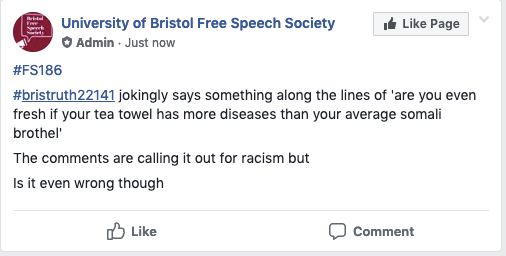
Furthermore, it appears from discussion within the group that in-person debates are usually more respectful than these anonymous posts would indicate. The fundamental issue with Free Speech Society’s discussion group is a misunderstanding of how social media works, combined with lack of thought on behalf of the admins about who offensive posts are affecting.
Facebook groups, whether open or closed, are not private spaces. When admins post anonymous submissions, they are actively publishing a view to over 500 people and, by their own admission, indicating that it is a serious point of discussion.
A representative from the Free Speech Society told Epigram: ‘Posts are not endorsements of views, but are there to spawn discussion and so that members have the opportunity to respond to ideas they do not agree with.’
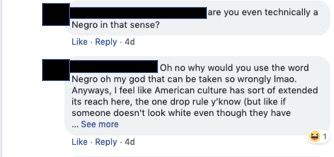
‘Our criteria are (sic) that post contents should not violate the law and that they refrain from using aggressive or confrontational language’, the spokesperson stated, ‘We also try to enforce that within the group discussions’.
It is difficult to see how opening debate about the morality of paedophilia and or the validity of trans people is not confrontational. Some of the issues raised in the group, such as 1920s racial science, are not constructive topics for debate. Other topics are clearly not suited for a forum which allows anonymous submissions.
Free Speech Society have stated that: ‘If people find this shocking, it just proves that we still have a lot of work to do on campus’. Whether the wider University would benefit from debate around paedophilia, incest, anti-Semitic conspiracy theories or Islamophobia, should perhaps be the next point of discussion.
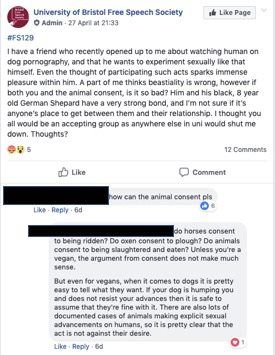
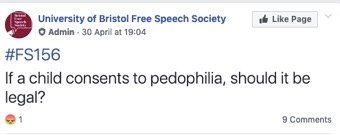
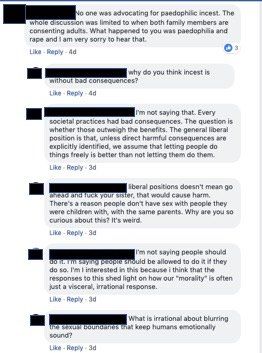
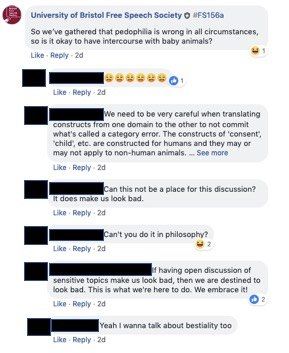
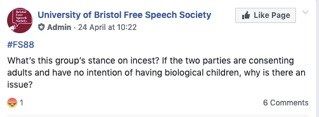
Update
After the issues raised were put to the Free Speech Society, discussion began in the group about whether anonymous submissions were constructive or not.
Following a motion passed at the society's annual general meeting yesterday, The Free Speech Society have closed their anonymous submissions tool temporarily because 'serious reform is needed before it can be a tool for doing more good than harm.'
The spokesperson continued: 'The committee will be meeting and discussing how to do this best' and welcome suggestions.
They concluded: 'To repeat, this is not a final closure of the anonymous submissions. It is just a temporary maintenance closure. We hope to have it up and running again asap'.
Featured Image: Epigram / Ed Southgate
What do you think of the Free Speech Society? Let us know.








